
Aleksandr Isayevich Solzhenitsyn was a Russian novelist, philosopher, historian, short story writer, and political prisoner. One of the most famous Soviet dissidents, Solzhenitsyn was an outspoken critic of communism and helped to raise global awareness of political repression in the Soviet Union (USSR), in particular the Gulag system. In later years, however, Solzhenitsyn had been disillusioned with the US's involvement in Russia's free market reforms and the collapse of Russian social systems due to chaotic privatisation. He returned to Russia in the mid 1990s.

The Gulag, GULAG, or GULag was the government agency in charge of the Soviet network of forced labor camps set up by order of Vladimir Lenin, reaching its peak during Joseph Stalin's rule from the 1930s to the early 1950s. English-language speakers also use the word gulag to refer to all forced-labor camps that existed in the Soviet Union, including camps that existed in the post-Lenin era.

The Gulag Archipelago: An Experiment in Literary Investigation is a three-volume non-fiction text written between 1958 and 1968 by Russian writer and Soviet dissident Aleksandr Solzhenitsyn. It was first published in 1973, and translated into English and French the following year. It covers life in what is often known as the Gulag, the Soviet forced labour camp system, through a narrative constructed from various sources including reports, interviews, statements, diaries, legal documents, and Solzhenitsyn's own experience as a Gulag prisoner.
The concept of a carceral archipelago was first used by the French historian and philosopher Michel Foucault in his 1975 publication, Surveiller et Punir, to describe the modern penal system of the 1970s, embodied by the well-known penal institution at Mettray in France. The phrase combines the adjective "carceral", which means that which is related to jail or prison, with archipelago—a group of islands. Foucault referred to the "island" units of the "archipelago" as a metaphor for the mechanisms, technologies, knowledge systems and networks related to a carceral continuum. The 1973 English publication of the book by Solzhenitsyn called The Gulag Archipelago referred to the forced labor camps and prisons that composed the sprawling carceral network of the Soviet Gulag.
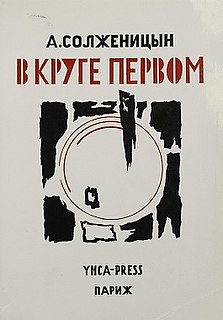
In the First Circle is a novel by Russian writer Aleksandr Solzhenitsyn, released in 1968. A more complete version of the book was published in English in 2009.

One Day in the Life of Ivan Denisovich is a short novel by the Russian writer and Nobel laureate Aleksandr Solzhenitsyn, first published in November 1962 in the Soviet literary magazine Novy Mir. The story is set in a Soviet labor camp in the early 1950s and describes a single day in the life of ordinary prisoner, Ivan Denisovich Shukhov.

The Solovki special camp, was set up in 1923 on the Solovetsky Islands in the White Sea as a remote and inaccessible place of detention, primarily intended for socialist opponents of Soviet Russia's new Bolshevik regime. The first book on the Gulag, namely, In the Claws of the GPU (1934) by Francišak Aljachnovič, described the Solovki prison camp.
Claude Lefort was a French philosopher and activist.
This is a bibliography of Aleksandr Solzhenitsyn's works.
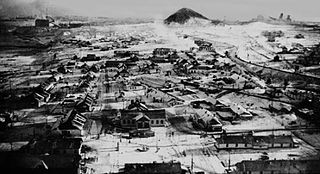
The Vorkuta Uprising was a major uprising of forced labor camp inmates at the Vorkuta Gulag in Vorkuta, Russian SFSR, USSR from 19 July to 1 August 1953, shortly after the arrest of Lavrentiy Beria. The uprising was violently stopped by the camp administration after two weeks of bloodless standoff.
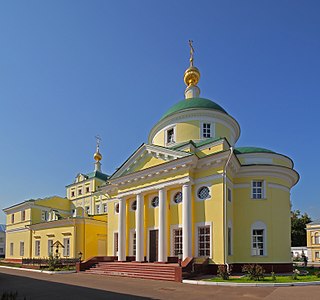
Sukhanovka, short for Sukhanovskaya osoborezhimnaya tyur'ma 'Sukhanovo special-regime prison,' was a prison established by the NKVD under N. I. Yezhov in 1938 for "particularly dangerous enemies of the people" on the grounds of the old Ekaterinskaia Pustyn' Monastery near Vidnoye, just south of Moscow. Known officially as Special Object 110, it was said to be worse than the Lubyanka, Lefortovo, or Butyrka prisons in Moscow itself. From 1958 it was a jail hospital. During 1992 the prison was returned to the church as a monastery and on November 17, 1992, the first vows were made within its walls.
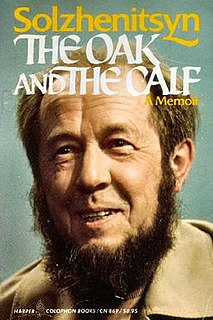
The Oak and the Calf, subtitled Sketches of Literary Life in the Soviet Union, is a memoir by Russian writer Aleksandr Solzhenitsyn, about his attempts to publish work in his own country. Solzhenitsyn began writing the memoir in April 1967, when he was 49 years old, and added supplements in 1971, 1973, and 1974. The work was first published in Russian in 1975 under the title Бодался телёнок с дубом. It has been translated into English by Harry Willetts.
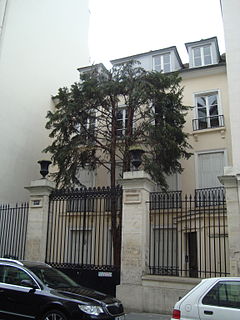
Éditions du Seuil, also known as Le Seuil, is a French publishing house established in 1935 by Catholic intellectual Jean Plaquevent (1901–1965), and currently owned by La Martinière Groupe. It owes its name to this goal "The seuil (threshold) is the whole excitement of parting and arriving. It is also the brand new threshold that we refashion at the door of the Church to allow entry to many whose foot gropes around it".

Alexander Andreyevich Svechin was a Russian and Soviet military leader, military writer, educator and theorist, and author of the military classic "Strategy".
Art and culture took on a variety of forms in the forced labor camps of the Gulag system that existed across the Soviet Union during the first half of the twentieth century. Theater, music, visual art, and literature played a role in camp life for many of the millions of prisoners who passed through the Gulag system. Some creative endeavors were initiated and executed by prisoners themselves, while others were overseen by the camp administration. Some projects benefited from prisoners who had been professional artists; others were organized by amateurs. The robust presence of the arts in the Gulag camps is a testament to the resourcefulness and resilience of prisoners there, many of whom derived material benefits and psychological comfort from their involvement in artistic projects.

Fabrizio Calvi was a French investigative journalist who specialized in cases involving organized crime and the secret services. He worked as a writer and journalist and was the author of several films. He wrote more than 20 books and 40 films, including Série noire au Credit Lyonnais, L’orchestre noir, Les routes de la terreur 911 and Elf, une afrique sous influence, all of which were broadcast by Arte.

Nicolas Werth is a French historian.
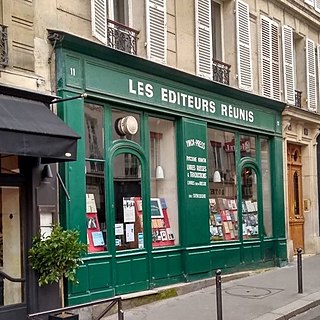
YMCA-Press is a publishing house originally established by the YMCA and located in Paris, also known as Librairie des Editeurs Réunis (bookstore) or Centreculturel Alexandre Soljenitsyne.

Heli Susi was an Estonian teacher and translator.

Semyon Grigoryevich Firin was a Soviet officer in the intelligence services OGPU and NKVD. Later in his career, he was a leader in different Gulag forced labor camps until he was executed during the Great Purge.
















